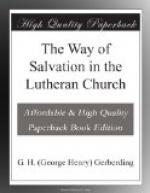“The same Church which in the days of the Reformation raised her voice against these errors, when she found the entire life of Christianity endangered by them, can be silent in the present hour, when the same errors appear all around her, only by betraying her trust, and incurring the guilt of the faithless watchman who fails to give alarm.”
Let us hear also the testimony of our late lamented Dr. Krauth. He says, as quoted by Rev. Trabert: “How often are the urging that we are all one, the holding of union meetings, the effusive rapture of all-forgiving, all-forgetting, all-embracing love, the preliminary to the meanest sectarian tricks, dividing congregations, tearing families to pieces, and luring away the unstable. The short millennium of such love is followed by the fresh loosing of the Satan of malevolence out of his prison, and the clashing in battle of the Gog and Magog of sectarian rivalry. There is no surer preparation for bitter strife, heart-burnings, and hatred, than these pseudo unionistic combinations. One union revival has torn religious communities into hateful divisions which have never been healed.... And none have suffered so much, by these arts, as our Lutheran people, who, free from guile themselves, did not suspect it in others. Well might we ask with the ‘Apology:’ ’Are they not ashamed to talk in such terms of love, and preach love, and cry love, and do everything but practice love?’”
In conclusion we wish to present the testimony of some of the most eminent divines of the Methodist Episcopal Church. Of all others they will certainly not be accused of being prejudiced against modern revivals. And of all modern revivals, those conducted by the Evangelists, Moody and Sankey, are probably the least objectionable.
At the close of the celebrated “Hippodrome revival,” in New York City, conducted by Messrs Moody and Sankey, in the spring of 1876, the Methodist Episcopal ministers, at a stated meeting, reviewed the revival and its results. The New York Herald gave the following account of their meeting, which we copy from Rev. Trabert’s tract: “The Methodist ministers had under consideration the question of the value of special evangelistic efforts in regular Church work, with particular reference to the number of Hippodrome converts who may have united with their churches. For two weeks a member of the Hippodrome committee had distributed cards to the preachers with the names of persons who declared themselves converts of Mr. Moody’s meetings. Four thousand had been reported as the fruits of the ten weeks special effort. Ten thousand inquirers had been reported.




